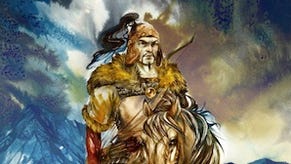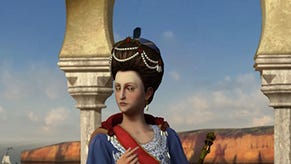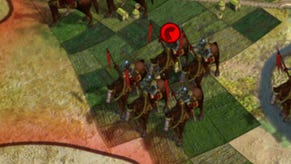Diplomatic Relations: Helping New Civ V Players Join a Brave New World
We chat with Firaxis about keeping the gates open for new players with the newest Civilization V expansion.
This article first appeared on USgamer, a partner publication of VG247. Some content, such as this article, has been migrated to VG247 for posterity after USgamer's closure - but it has not been edited or further vetted by the VG247 team.
Confession time. I've purchased every version of Civilization V up until this point, but I have yet to actually install and play any of them. Back when I had more time, I was an avid Civilization player, staying up late into the night making trades, conquering Civs, and advancing my tech tree. When Civilization V came out, I had the aspiration of spending that same time with a brand-new game. That same aspiration was revived with Gods & Kings, but the follow-through never happened. Every time I heard about a new system, even the task of just starting seemed daunting.
Two expansions into Civilization V, I wondered: what was Firaxis doing to make it easy for new players to start on a game that was getting better with each iteration? So, I decide to get on the phone with Civilization V: Brave New World lead designer Ed Beach and Civilization senior producer Dennis Shirk to ask them that question.
"We spent a lot of time on the Civilization V vanilla game, keeping new players very much in mind," was Shirk's reply. "It would've been easy for us to just build on Civilization IV, but we really wanted to open up the audience. We were already doing a lot of new gameplay systems that would even be new for our hardcore fans, especially One Unit Per Tile, switching to hexes, all of those kinds of things. So we wanted the game to be as approachable as possible: whether you've been playing Civilization IV for the last four years or you're a player that's brand-new to the game, we wanted to make sure it was really easy."
"One thing that flows naturally with Civilization and making it easier for new players to pick up is the way that [Sid Meier] originally designed it," he adds. "When you start a new game, you have one settler and one warrior. That's as simple as its gets. Someone can understand that. They start a city, then they might have one or two choices. The game doesn't really get complex until the player is ready for it. We try to approach each new iteration of the game with that same outlook."
It would've been easy for us to just build on Civilization IV, but we really wanted to open up the audience.
It seemed like a pretty straightforward answer, but in my mind, the addition of new systems Trade Routes, the World Congress, and Tourism make the game feel more complex. Wouldn't that be the same for other players?
"What we did think very carefully about was when each new system came online for the player," says Beach. "We wanted to make sure that we spaced those out. Not everything is hitting the player at once. There's a nice pacing in terms of how the new systems roll out to the player. In Brave New World, the only thing that's a standard part of Civilization gameplay is religion and trade routes. Those both come on early; trade routes probably come even earlier than religions do. One of those systems was introduced in Gods & Kings, so we didn't feel like we were overwhelming the player with too much at once."
"One thing we always want to keep in mind is that with each expansion, we're building on that same audience," interjects Shirk. "These are players that have become experts in the gameplay that we added onto the vanilla game and Gods & Kings. We didn't feel that we had to avoid additional complexity for these players. They wanted that new challenge to give them more to play with and more knobs to turn."
Beach acknowledges that designing an expansion is walking a tightrope between pleasing existing players and giving new players a reason to join in on the fun. Old players want certain things in their expansions, sometimes to the exclusion of neophytes.
"The old players have expectations based on systems they've seen in previous titles," he tells me. "Features that were in Civ III and IV that we never carried over into V. They were expecting us to bring new systems online, but they envisioned them being similar to the way they had been in previous titles. Each time we brought online a new system - trade caravans had been all the way back in Civ II I think - we wanted to really rethink it from the ground up. We wanted to make sure it fit well with the Civ V universe, which we do feel is very different than any of the previous iterations."
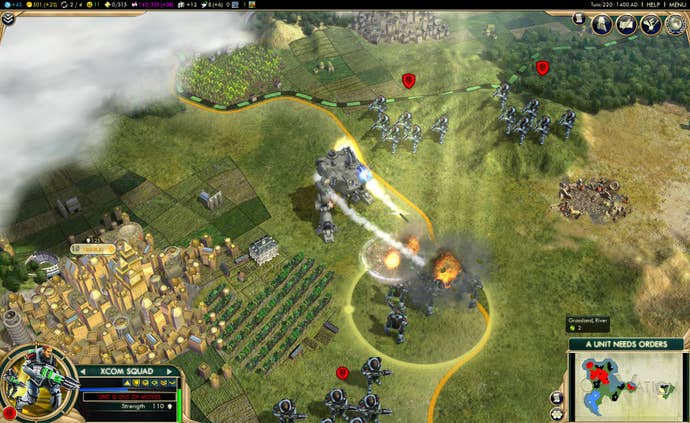
Beach outlines the new World Congress system, which allows Civs to vote collectively on the rules that will affect the game. United Nations-style voting was present in Civilization IV, but this time citystates are a part of the process. Part of the skill involved requires navigating the diplomatic waters of these citystates to get them on your side.
"As we started crafting the World Congress, we wanted to make sure that the citystates still had an important voice," explains Beach. "All the interactions you had with the citystates in Civ V, we wanted that to be the way you built up your diplomatic capital. In general, we want to bring online new systems and we want to be aware what the fanbase is telling us about what types of gameplay are very interesting to them. Every time we put in a new system, we want to think about it in a fresh light and make it sure it's really fitting in well with the rest of the game that we're putting together."
The first iteration of Civilization V was a bit of a shift from previous titles, partly due to the expansive vision of its lead designer, Jon Shafer. Shafer wanted to build a new Civilization for a new generation. Unfortunately, there was some fan backlash to the changes.
"We made a lot of changes to the core game. Jon Schafer set out to really change the experience and bring out something new, because the core experience hadn't changed too much," admits Shirk. "It was always refined. In III and IV there were new systems added, but he really wanted to change and mix it up a little bit. When you're developing a game, the whole team has bought into it and we really liked where it was at. It ended up being a stellar platform for us to build on, but we definitely have some pushback from our hardcore fans when it came out. They didn't feel like there was enough there. Hopefully, we've satiated that, but we've learned a lot from that core development."
I ask both gentlemen if they feel Brave New World is the Civilization V that Firaxis always wanted, or if the studio is just augmenting what it feels is a complete experience.
"Whenever we put one out - especially with Gods & Kings - we like to think that it's a complete experience as we're exiting out of it and then we keep thinking about it," Shirk replies. "More ideas keep coming up and then we suddenly have a whole batch of new content that we want to add to the game. It's not something to do to plan out each version and say 'this is going to be in this expansion'. That would be difficult to do, because honestly we're putting a good chunk of our creative brains into everytime we start making a new expansion."
"Part of that was Brave New World was us having played the game for a long time and coming to our own conclusions about where it needed augmentation," Beach adds. "And also us listening to the community and seeing how their experiences were. We knew right up front that Gods & Kings had addressed alot of things earlier in the game and there was space late in the game for new systems. That's really what Brave New World addresses most directly. On the same hand, we also want to look at things like which ways are people finding playing Gods & Kings the most fun? Was it interesting to pursue a cultural victory? That's also where we found room for improvement."
Beach notes that the focus for Brave New World was to improve the endgame as much as Gods & Kings improved the earlier parts of Civ V. Part of changing that endgame was adding a bit of uncertainty to the late game.
"We wanted people to get into the industrial and modern eras and not know how the game was going to turn out," says Beach. "We wanted them to not know which path to victory was going to be the easiest for them. The fact that the World Congress comes into play and the number one thing it does is it lets you pass resolutions that change the rules of the game. That right there is a way to shake up the endgame. It helped up achieved this goal of players getting to the late part of the game of Civilization and finding it fascinating because they did not know how it was going to unfold."
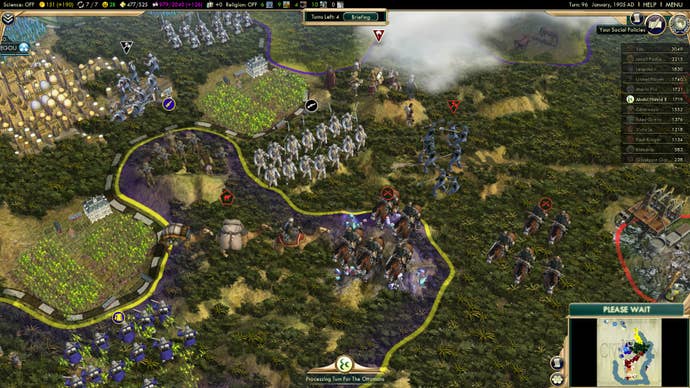
Civilization V joined the Steam Workshop in June 2012, meaning there was now a single, simple repository for mods that every player could access without hunting. According to Shirk, Firaxis "definitely" saw a bump in players when Steam Workshop went live.
"There were a lot of players that didn't know what mods were or how to use them." he says. "We always had that section of the game, but there was nothing talking about mods when you started it up. No system to promote them. Workshop really allows anybody to create mods. We love the system. We know they're going to be doing better things with it as they move forward and we're going to keep taking advantage of it. It's an amazing way for your novice players to become junior designers."
That's the audience we're talking to. People that want to be engaged for a very long time and watching your investments pay off over the course of the game.
"It's interesting because now that our game is up on Steam, we can actually see how many people are playing it every day," says Beach. "The numbers are very, very encouraging. Civilization V is actually picking up support now that Brave New World is out."
Of all of the mods created since the Steam Workshop launch, Shirk points to R.E.D., authored by Steam user Gedemon, as one of the best out there.
"It's an amazing World War II mod. He created an unbelievable number of custom units. He did an amazing job," says Shirk, with clear respect in his voice.
Finally, I ask about Civilization's place in a world where people are trending towards shorter, mobile, and free-to-play experiences. Do the five hour game times found in Civilization V still have a lure for players?
"We have an enormous, vocal, engaged fanbase," replies Shirk. "People sometimes like that experience of spending an afternoon embedded in the game and thinking things through. Not everybody necessarily needs that kind of experience. That's not a bad thing; like a lot of other people, I like jumping into World of Tanks for a ten-minute playthrough. But sometimes I just want to sit down and I'm going to play five hours straight. That's the audience we're talking to. People that want to be engaged for a very long time and watching your investments pay off over the course of the game. It's not instant satisfaction."
If Shirk and Beach said all the right things for you, you can get the complete Civilization V experience with Gold Edition and Brave New World on Steam. Still on the fence? Check out our review of the latest expansion. Take your time, I'll be busy installing the entire game.


